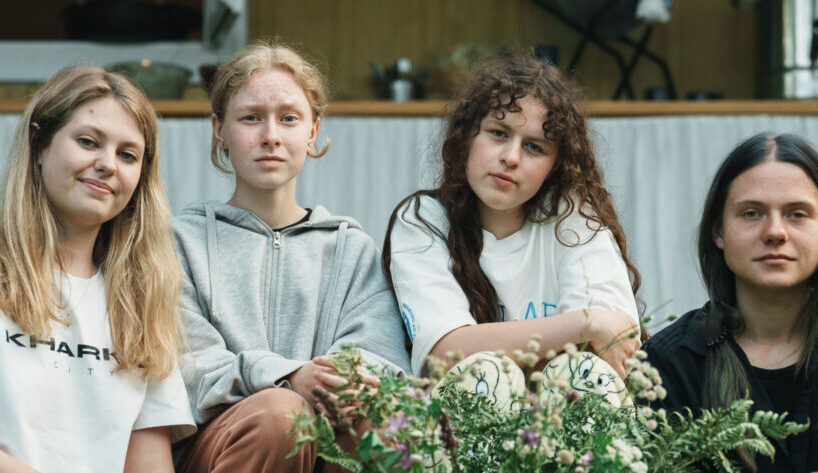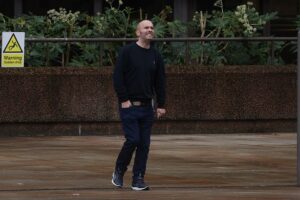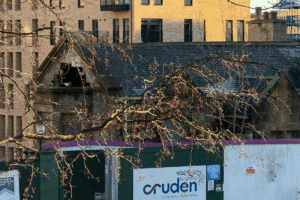
(function(w,q){w[q]=w[q]||[];w[q].push([“_mgc.load”])})(window,”_mgq”);
“I became more responsible”—and more aggressive
A 13-year-old Eva adores dancing hip-hop and contemporary, making TikTok videos, talking with friends, and living in her hometown of Sumy, a city in northeastern Ukraine that is facing the brunt of Russian drone and missile attacks. She lives there with her mom, dad, and 3-year-old younger brother. They returned in July 2022 after spending 3 months abroad, fleeing Russia’s war.
“I have become more organized, I react faster, and I can carry out important tasks for my mother,” Eva shared after three years of living in frontline Sumy.
“I became more responsible and focused: I realized that sometimes your decisions affect more than just your own life,” said Anna, 16, from Zaporizhzhia.
According to a survey by the Rating sociological group, 37% of Ukrainian children currently experience elevated or high stress levels, compared to just 27% in the fall of 2024. Symptoms of anxiety and depression are significantly higher than before 2020.
War has made Ukrainian children grow up faster, says Daria Zahraniuk, Head of Psychological Services at Save Ukraine. “Children take on adult responsibilities and decision-making. Sometimes, a 13-year-old child decides where the family will go because the mother is struggling.”
Ukrainian teenagers at a recovery gathering, initiated by the Voices of Ukraine NGO. Credit: Voices of Children
But this is not a positive thing, Daria continues. “At this age, children should still have their childhood, leisure, and play. Losing childhood creates consequences in adult life, which can appear in relationships, parenting, and emotional health.”
Despite what psychologists say, Eva proudly admits that she has become more responsible. After all, who didn’t want to be grown-up as a child?
Running to the bathroom when drones fly
“We live in an apartment building. If [a drone or missile] flies by at night, we first run to the corridor or bathroom. If the explosions are stronger, we go down to the first floor.”
Making the journey to the bomb shelter means venturing outside while drones and missiles fly above. “Going there with my little brother is dangerous,” Eva told Euromaidan Press.
Since 2022, Russia has frequently bombed Sumy with intense air and missile strikes, causing significant casualties and damage. Russia launched an offensive in Sumy Oblast in early 2025. Although they ultimately failed, Russian forces seized some villages and advanced to within 20 kilometres of the city.
Despite the constant danger, children remain. As of August 2025, 84,000 children require evacuation from at least four frontline oblasts: Dnipro, Donetsk, Kherson, and Sumy, the human rights centre Zmina reported. The actual number of children still living in frontline territories is likely higher.
Life under constant danger carries a heavy toll for young people whose physical, psychological, and emotional stability is still developing, Daria told Euromaidan Press.
Aggression, anxiety, and silence that feels wrong
At the same time, Eva says constant stress from unpredictable attacks has made her more aggressive, especially when her mom asks her to do something or things don’t go well at home.
“I can shout,” Eva admits.
“It is difficult for me to talk about war with people who left long ago or have never lived under shelling. But the strangest thing is the silence. In cities without explosions, I hear it too sharply, and it causes anxiety, as if something is missing in the air,” shared Anna.
About 37% of Ukrainian children report significant levels of stress, compared to just 27% in the fall of 2024, according to a social survey conducted by Rating Group from 3-7 October—similar to levels reported for high school students in the USA. However, American teens live in a comparatively stable and safe environment for recovery, unlike Ukrainian teenagers.
Ukrainian teenagers at a recovery gathering, initiated by the Voices of Ukraine NGO. Credit: Voices of Children
PTSD, depression, and a 17% spike in teen suicide
Children in Ukraine suffer from PTSD, anxiety disorders, and depression. These conditions are often caused by torture, coercion, bullying, and being forced to witness acts of abuse, the psychologist says. For children under Russian occupation, these traumas reach particularly extreme forms.
Lida was 17 when FSB officers raided her home in occupied territory on the morning of 15 November 2024.
The day before, her fiancé’s grandfather had been injured by a mine. Russian security services blamed him for collecting mines “for the arrival of Ukrainian forces.” At 7:30 am, over ten armed, masked men burst through the door.
“They pushed my mother-in-law’s face into the couch and pulled a hat over her head. They laid Vitya, my fiancé, face-down on the floor,” Lida recounted in testimony documented by a Ukrainian NGO. “They woke his younger brother with slaps, demanded his passport, forced him to his knees, twisted his arms behind his back, threw a shirt over his head, and taped it around his neck.”
Lida pretended to sleep when she heard Russian voices. “I heard them running between rooms and shouting.”
“She witnessed beatings and interrogations of her loved ones. She was threatened,” psychologist Daria explained. “These were extremely traumatic experiences. She became very closed off, trying not to show the depth of her trauma, as if she were pushing it down inside.”
When Lida turned 18, she fled Russian-occupied territories and returned to Ukraine.
Ukrainian children still living in occupied territories face their own horrors: forced to attend schools promoting Russian occupation, bullied for displaying Ukrainian identity, their houses raided by occupation authorities. They even face threats of rape.
Ukrainian girl. Illutsrtive photo. Credit: Voices of Children
Tetiana’s two daughters, 16-year-old Angelina and 13-year-old Snizhana, were bullied by classmates and teachers in their Russian school in Brylivka, a settlement in the occupied part of Kherson Oblast, because they could not speak or write Russian.
“They told us to start speaking Russian at school. But we can’t,” Tetiana said. The younger daughter, Snizhana, resisted with her rebellious character, while Angelina withdrew into herself.
The pressure became unbearable. “Angelina was constantly harassed by classmates. Nobody befriended her,” Tetiana explained. The girls attended school only one week per month to protect their mental health. “We tried not to go to school often. I would say we were sick or visiting relatives.”
The psychological damage extended beyond the classroom. Tetiana’s older daughter, now over 20, was forcibly “evacuated” by Russians to Tagil, Russia, and developed severe mental health problems. “She cut her wrists. They put her in a psychiatric hospital for treatment for a month,” Tetiana recounted. After discharge, Russian doctors insisted she register with psychiatric services, but Tetiana refused, fearing authorities would take away her grandchild.
Ukrainian children living under occupation sometimes ideate suicide, psychologist Daria says. Neutralizing these thoughts is “very difficult and painstaking work” that requires extensive and extended therapy.
Ukraine’s suicide rate in 2025 is approximately 21.6 deaths per 100,000 population, ranking Ukraine 11th worldwide. The rate has jumped by 17% among adolescents aged 14-16 in the last year. In comparison, the 2022 US suicide rate is about 15 deaths per 100,000 people.
Ukrainian teenager. Illutsrtive photo. Credit: Voices of Children
Psychological support: “I feel much better after meetings”
Eva is in middle school and studies mostly online because of limited space in the school bomb shelter. Online classes are convenient, especially after night attacks. But this makes her sad because of the lack of communication with peers.
“I miss lively communication with my friends. My friends stayed in Sumy; some have left. I stopped talking to a girl I had been friends with for five years because she went abroad. Now I have a few friends—a girl from dance class. Other friends are in different cities.”
Eva says the live meetings at the Voices of Children NGO have been her saving grace. The foundation offers psychological support to children and families affected by war through online sessions, camps, and case management. There, they engage in relaxation techniques, finger painting, mosaic making, and crafts.
“After such meetings, I feel much better,” Eva says.
Ukrainian teenagers at a writing cources, initiated by the Voices of Ukraine NGO. Credit: Voices of Children
Ukrainian kids at a recovery gathering, initiated by the Voices of Ukraine NGO. Credit: Voices of Children
Anna, 16, from Zaporizhzhia, recovers through community. She is studying at the A+ Distance Education Centre and volunteering with the NGO Urbanization. “I stay close to social initiatives because in times when life shrinks to the boundaries of danger, people and community are the only things that make it expand.”
Anna also participated in a prose writing course from Voices of Children. She was drawn by the atmosphere—many peers on the same wavelength, compassionate organizers, and quality education.
“Writing became my additional support within myself.” She also credits her coursemates: “There were many fun times and positive moments, which I still carry in my head.”
The future: “I want to live fully, not just survive”
“I do not want to leave; I like it here—it is my home. When I grow up, I might move, but right now I want to stay here. Moves are difficult. I like going abroad only for vacation, not for permanent living,” Eva said.
Anna sees it differently. She is thinking about moving “to have a life path, an education, and a career.”
“Not out of fear—but because of the future. Zaporizhzhia has emptied out: shops, brands, teachers, jobs. The city is fighting, but its resources are running out. I want to live fully, not just survive.”
Recon teams are Moscow’s weapon of choice. Here’s how Ukraine must stop them
(function(w,q){w[q]=w[q]||[];w[q].push([“_mgc.load”])})(window,”_mgq”);





